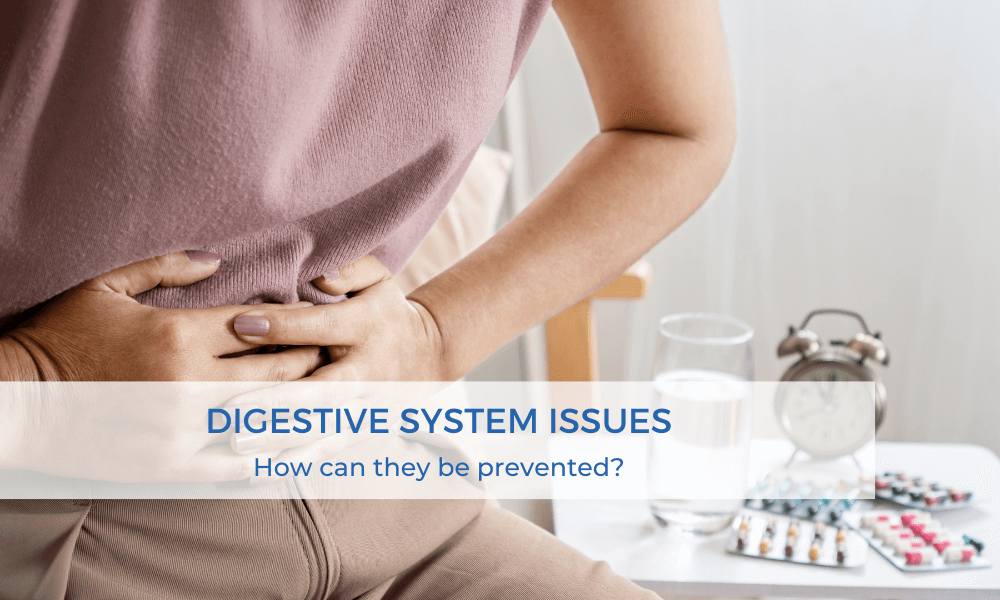
Digestive System Issues
Almost everyone has encountered digestive system issues at some point, as in most cases they come with everyday, not necessarily severe symptoms. Improper nutrition or stress can easily cause discomfort, but there are also diseases with more serious consequences. This time, we explored the topic of digestive system issues; in our article, we present why they may occur and what tips we suggest for prevention.
CAUSES OF DIGESTIVE SYSTEM ISSUES
Our digestive system is a complex system responsible for the intake, transformation, digestion, and absorption of food. The smooth functioning of the liver, pancreas, and gastrointestinal tract is essential for its operation. If any of these organs malfunction, we may face digestive system diseases.
Additionally, it ensures the effective functioning of our immune system. Every food we intake comes from the external environment. This food enters our body through the intestines, delivering essential nutrients to every cell in the body.
Therefore, this organ not only ensures the proper placement of food and removal of waste but also provides protection against harmful external substances. For example, if our digestive system identifies a nutrient as dangerous, symptoms will immediately appear.
Moreover, it is important to know that there is a neural connection between our digestive system and brain, so constant two-way communication occurs between the two organs. Therefore, digestive system issues may not only be caused by external environmental factors but also by internal stress, depression, or anxiety.
MOST COMMON DIGESTIVE SYSTEM ISSUES
BLOATING
Bloating is one of the most common digestive system problems usually triggered by some kind of food. Cauliflower or cabbage contains carbohydrates that we cannot digest and absorb.
In this case, these carbohydrates, upon reaching the colon, produce gas. Besides vegetables, acidic drinks can also cause similar symptoms, resulting from the release of carbon dioxide.
Solution: Aim to consume fiber-rich foods, such as vegetables and oats. If faced with the above problem, perform abdominal exercises to aid digestion.
CONSTIPATION
Constipation is also classified as a digestive system issue as it signifies bowel function and stool evacuation disorders. It occurs when we consume a small amount of low-fiber food. When we eat little or skip meals, the stimuli triggering bowel movements are absent, resulting in so little waste formation that bowel movements become almost unnecessary.
Solution: Proper nutrition is the key solution in this case as well. Try to eat several smaller meals a day, and preferably consume whole grain foods that promote bowel movements. Adequate fluid intake and regular exercise are also extremely important!
DIARRHEA
Diarrhea, occurring several times a day, can have several causes. It can be an infection, sensitivity, or inflammation. In cases of diarrhea, fluid replenishment is extremely important, as there is a risk of dehydration. Additionally, the body loses much more salt than sugar, so attention should be paid to salt intake as well.
Solution: Avoid dairy products, fatty foods, and sugary, fibrous sodas, and try to consume constipation-relieving foods such as bananas, apples, and rice.

SEVERE DIGESTIVE SYSTEM ISSUES
REFLUX
Reflux is also among the digestive system issues. In this case, acidic stomach contents flow back into the esophagus. One reason for this is that the lower esophageal sphincter located at the bottom of the esophagus opens due to pressure from the abdomen. The other reason may be weakness of the lower esophageal sphincter.
Stomach acid plays a serious role in our stomach as it helps in digestion and destroys harmful substances. In the stomach, acid cannot cause harm, but in the esophagus, it can. It can cause serious diseases such as inflammation of the mucous membrane or chronic lung disease.
Reflux is accompanied by numerous complaints. Heartburn, which is one of the most typical symptoms, is one of them. Acid irritation in the esophagus can make swallowing difficult, causing swallowing disorders. Additionally, stomach acid can also enter the airways, resulting in dry cough.
Solution: Proper nutrition can help alleviate symptoms. It is advisable to avoid hard-to-digest, overly fatty foods, and it is recommended to have several smaller meals a day. Avoiding carbonated drinks is also recommended, as they can have a bloating effect.
CROHN'S DISEASE
In the case of Crohn’s disease, we are talking about chronic inflammation of the intestine. Inflammation can occur at any stage from the oral cavity to the anus. It can affect isolated segments of the intestine and not only the mucous membrane but also the entire intestinal wall can be inflamed. Diarrhea is one of the most characteristic symptoms.
Such digestive system issues generally come with an absorption disorder. This means that important vitamins and minerals for the body cannot be absorbed. This deteriorates the patient’s condition, resulting in loss of appetite, fatigue, and possibly anemia.
Solution: Besides conventional drug therapy, proper nutrition is also important here. Since it is more difficult to get the necessary vitamins and trace elements into our body in this case, it is important to have multiple daily, vitamin-rich meals and adequate fluid intake.
OTHER DIGESTIVE SYSTEM ISSUES
STRESSFUL SITUATIONS
Our mental problems can often affect our bodies. Before a serious exam or job interview, or in an uncomfortable situation arising from our personal lives, our stomach often cramps. Digestive system issues are very common in stressful situations because the body focuses not on digestion but on the given problem.
In many cases, digestion slows down, so we may experience constipation. Of course, the opposite, diarrhea, can also occur. In this case, stress hormones actually stimulate the movement of the colon, so the body would get rid of waste more quickly.
Digestive system issues are often accompanied by unpleasant symptoms such as irritability, fatigue, and hair loss.

It really matters how and why our hair is falling out. It’s worth considering if there have been any recent changes or discomforts affecting us.
Solution: If we notice these symptoms in ourselves, try to calm down and distract our thoughts. Taking a hot bath or reading a captivating book can easily help with this, but a soothing lemon balm tea can also do the trick.
IRRITABLE BOWEL SYNDROME (IBS)
Irritable bowel syndrome is most often associated with gastrointestinal functional disorder. However, since there are no specific symptoms, diagnosing it is much more difficult than in other diseases. Its causes are still being researched, but it is generally attributed to a disruption in the exchange of information between the intestines and the brain.
The most common complaint is diarrhea or constipation, as well as lower abdominal cramps and pain. Often these are accompanied by bloating and vomiting. However, since these symptoms can also indicate other diseases, it is advisable to undergo examination if we notice such complaints.
In addition to digestive problems, mood swings and depression are also very common. At this point, not only does the intestinal muscle become more spasmodic, but the immune system also weakens, thus reducing resistance.
Solution: If we are sure that we are dealing with IBS, it is advisable to follow some advice. Foods rich in fiber and fermented dairy products have a beneficial effect on our intestinal flora, so it is worth including them in our diet.
Try to avoid stressful situations, but if this is not possible, try to resolve them. Find the right sport or hobby for you! These activities have a mood-enhancing effect, which can be easily incorporated into our daily lives, alone or with others.
ABSORPTION PROBLEM
The absorption of vitamins and minerals, as well as water, mainly takes place in the intestines. We speak of an absorption disorder when the mucous membrane of the intestine does not function properly. If someone is struggling with an absorption disorder, it usually manifests itself in weight loss.
Due to digestive system disorders, vitamins and minerals, as well as water, cannot or are difficult to absorb, leading to numerous other illnesses. For example, hair loss and scalp problems. Do not panic if you experience such symptoms, as there is a solution!
In addition to proper nutrition, we can help our scalp and hair with various natural products. Our Oxygeni Hair Oily hair care products deeply cleanse and moisturize the scalp and hair strands. It also fills the hair strands with vitamins and has a detoxifying effect.

DIGESTIVE SYSTEM ISSUES
Unfortunately, it is a fact that the ingredients consumed with our meals nowadays do not contain enough useful micronutrients. In addition, irregular eating, a hectic lifestyle, and lack of exercise also affect the proper functioning of the digestive system. It is important that we can introduce enough vitamins and nutrients into our bodies.
Proper nutrition and exercise not only protect against digestive problems but can also greatly improve our well-being and mood. If you need lifestyle advice, don’t hesitate to turn to our hair care specialists, who can help with lifestyle-related questions alongside providing hair care guidance!
REVIEWS ABOUT THE OXYGEN THERAPY AND THE OXYGENI HAIR PRODUCTS








Follow us on our social media platforms!


